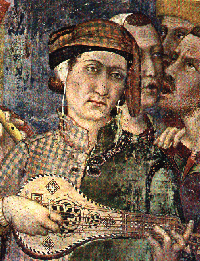|
Composers

Handel

Haydn

Rossini

Mendelssohn

Stravinsky
|
 Oratorio
A musical piece based on a religious
story and deploying orchestra, choir and soloist singing.
The oratorio resembles the opera
Oratorio
A musical piece based on a religious
story and deploying orchestra, choir and soloist singing.
The oratorio resembles the opera in its development and musical characteristics,
only it is not performed in the theatre with
stage design and costumes, but in the concert hall.
Unlike the opera, which presents
human figures that are not religious, the oratorio is based on religious
stories, biblical stories - from the Old and New Testament.
The development of opera and oratorio
started approximately at the same time, in the 16th century, when the church
decided to attract people's attention to religion through composition and
the staging of liturgical stories. Italian
in its development and musical characteristics,
only it is not performed in the theatre with
stage design and costumes, but in the concert hall.
Unlike the opera, which presents
human figures that are not religious, the oratorio is based on religious
stories, biblical stories - from the Old and New Testament.
The development of opera and oratorio
started approximately at the same time, in the 16th century, when the church
decided to attract people's attention to religion through composition and
the staging of liturgical stories. Italian Carissimi
Carissimi ,
a 17th century composer, cancelled decor, costumes and theatrical production
as a whole, in his oratorios ("Jephte"
is the best-known among them) and replaced it with a narrator, telling
the plot in "dry" recitative ,
a 17th century composer, cancelled decor, costumes and theatrical production
as a whole, in his oratorios ("Jephte"
is the best-known among them) and replaced it with a narrator, telling
the plot in "dry" recitative (recitativo seco).
(recitativo seco).
Indeed, Haydn also wrote oratorios ("The
Creation", and "The
Seasons"), as did Rossini
also wrote oratorios ("The
Creation", and "The
Seasons"), as did Rossini ("Moses
in Egypt"), yet the
greatest of oratorio composers was Handel
("Moses
in Egypt"), yet the
greatest of oratorio composers was Handel ,
who brought this genre to its peak, in a series of biblically-inspired
epics. In oratorios such as "Judas
Maccabaeus", "Joseph",
"Samson",
and especially "Messiah" ,
who brought this genre to its peak, in a series of biblically-inspired
epics. In oratorios such as "Judas
Maccabaeus", "Joseph",
"Samson",
and especially "Messiah"  ,
these constituted the height of oratorio, Handel uses all the baroque ,
these constituted the height of oratorio, Handel uses all the baroque composition techniques and forms, and places
the choir in the center of the piece.
After Handel, the oratorio gradually
withdrew. Although great composers like Mendelssohn
composition techniques and forms, and places
the choir in the center of the piece.
After Handel, the oratorio gradually
withdrew. Although great composers like Mendelssohn ("Elijah")
and Stravinsky
("Elijah")
and Stravinsky ("Oedipus
Rex") wrote wonderful oratorios, no prominent
composer set the oratorio at the core of his work, as Handel did.
("Oedipus
Rex") wrote wonderful oratorios, no prominent
composer set the oratorio at the core of his work, as Handel did.
|
Xtend
 Listen
Listen
 Period
Period
 Notes
Notes
 Dictionary
Dictionary
 Internet
Internet
 Projects
Projects
 Finders
Finders
|